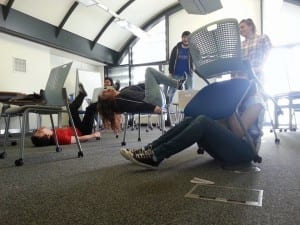Arts council England’s’ (ACE) has five main policies to meet the criteria of ‘excellence, reach, sustainability, young people and diversity’. These policies are there to give companies a target to make the ambition of ACE happen so that an ‘excellent culture can thrive’ (Arts Council, 2015) in England. The expectations of the National Portfolio (NPOs) and applying NPOs is that they must apply to all of these goals in order to be considered and accepted for funding. Grants for the arts are lottery funded, and therefore limited so regulations make applications competitive.
Understanding the requirement for these arts organisations opens many doors to a theatre company. If Forefront Theatre later decide to take their work to tour we will need the backing of the Arts Council to strive in this industry.
The method of looking at the application questions of such funders in thorough detail helped our company to really get to grips on the type of theatre we want to put on and what we stand for.
Following on from this we looked at how do create a budget for our theatre company. I then went onto exploring formulas we could incorporate to our company budget so we have a strong overhead projection for achieving what we want to achieve in props to printing costs. As it stands the each company has been given £166.67 to distribute. As a small company our income is far less and so is our expenditure. I am looking into fundraising opportunities for ForeFront Theatre Company to develop our funds. At the moment I am looking at planning four focused events to have as contingency if we need more for this show.
Potential fundraising events:
1 Host a baking event:
Food related events at University are always a win! Any cakes baked must be in fitting to the company name or company colour-scheme. This week I have enquired to the University Library to ask would we be able to host a bake sale in the Freezone room. The answer was yes. I have the contact details to the management of the library who we would need to arrange a date with. If funds become low a small scale bake sale would be our best call for quick funds and promotion.
2 Crowd funder:
After exploring various fundraising sites I would like to set up a link for Crowd Funder so we can be sure to get the income we need to develop larger projects
3 Forefront to Host a live Music event:
This would be charging £2 for entry. Our own company members would perform, and any contacts who would like an opportunity to perform can do so but would be unpaid, however they would be given a complementary drink and a ticket to our show for a 20 minute set.
4 School workshops:
I have contacted local schools heads of drama departments for a potential opportunity for us to workshop our work. We must develop our concept and company for a few months before these sessions. Another difficulty in running schools workshop at the moment would be only a few members currently have CRBs as of present. So the full company wouldn’t be able to lead a workshop yet.
Works cited:
Arts Council: Our mission and strategic framework (2015) [online] Available at http://www.artscouncil.org.uk/what-we-do/mission [Accessed 15/02/15].

